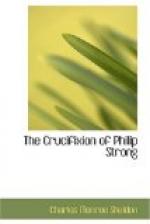To his surprise, when he went down through the business part of the town, he discovered that his sermon of Sunday had roused almost every one. People were talking about it on the street—an almost unheard-of thing in Milton. When the evening paper came out it described in sensational paragraphs the Reverend Mr. Strong’s attack on the wealthy sinners of his own church, and went on to say that the church “was very much wrought up over the sermon, and would probably make it uncomfortable for the reverend gentleman.” Philip wondered, as he read, at the unusual stir made because a preacher of Christ had denounced an undoubted evil.
“Is it, then,” he asked himself, “such a remarkable piece of news that a minister of the gospel has preached from his own pulpit against what is without question an unchristian use of property? What is the meaning of the church in society unless it is just that? Is it possible that the public is so little accustomed to hear anything on this subject that when they do hear it it is in the nature of sensational news?”
He pondered over these questions as he quietly but rapidly went along with his work. He was conscious as the days went on that trouble was brewing for him. This hurt him in a way hard to explain; but his sensitive spirit felt the cut like a lash on a sore place.
When Sunday came he went into his pulpit and faced the largest audience he had yet seen in Calvary Church. As is often the case, people who had heard of his previous sermon on Sunday thought he would preach another like it again. Instead of that he preached a sermon on the love of God for the world. In one way the large audience was disappointed. It had come to have its love of sensation fed, and Philip had not given it anything of the kind. In another way it was profoundly moved by the power and sweetness of Philip’s unfolding of the great subject. Men who had not been inside of a church for years went away thoughtfully impressed with the old truth of God’s love, and asked themselves what they had done to deserve it—the very thing that Philip wanted them to ask. The property owners in the church who had felt offended by Philip’s sermon of the Sunday before went away from the service acknowledging that the new pastor was an eloquent preacher and a man of large gifts. In the evening Philip preached again from the same theme, using it in an entirely different way. His audience nearly filled the church, and was evidently deeply impressed.
In spite of all this, Philip felt that a certain element in the church had arrayed itself against him. Mr. Winter did not appear at either service. There were certain other absences on the part of men who had been constant attendants on the Sunday services. He felt, without hearing it, that a great deal was being said in opposition to him; but, with the burden of it beginning to wear a little on him, he saw nothing better to do than to go on with his work as if nothing unusual had taken place.




